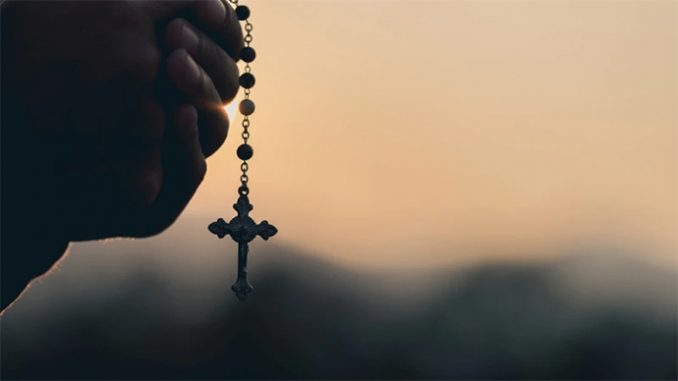
ACI Prensa Staff, Jul 27, 2025 / 17:18 pm (CNA).
An armed group linked to the Islamic State on Sunday killed dozens of worshippers at a Catholic church in the northwest of the Democratic Republic of Congo while they were participating in a prayer vigil.
According to the BBC, members of the Allied Democratic Forces (ADF) stormed a church in the town of Komanda, where they shot and killed the worshippers, then looted and set fire to nearby businesses.
Komanda is in the Ituri province of the Democratic Republic of Congo, an area rich in minerals and whose control is disputed by several armed groups.
Dieudonne Duranthabo, a coordinator of civil society in Komanda, told the Associated Press: “More than 21 people were shot dead inside and outside [the church] and we have recorded at least three charred bodies and several houses burned. But the search is continuing.”
Aime Lokana Dhego, a local priest, told AFP: “We have at least 31 dead members of the Eucharistic Crusade movement, with six seriously injured. Some young people were kidnapped; we have no news of them.”
On the other hand, Radio Okapi estimated the number of dead at 43.
Italy Foreign Minister Antonio Tajani on Sunday condemned the massacre through his X account: “I express the strongest condemnation of the attack on a church in Komanda, in the Democratic Republic of Congo, where a terrorist group linked to ISIS killed more than 40 civilians.”
“Places of worship must always be preserved and religious freedom must be protected. Italy stands in solidarity with the families of the victims and the Congolese people,” he added.
What is the ADF?
The ADF emerged in Uganda in the 1990s, according to the BBC, accusing the government of persecuting Muslims, but is now based across the border in the Democratic Republic of Congo, where they regularly attack civilians of all religions, as in Uganda.
Vatican News said the ADF is “responsible for the murder of thousands of people. Two weeks ago they killed 66 people in the Irumu area.”
Jamil Mukulu, a Christian convert to Islam, is the founder of the ADF, which in early 2024, according to Vatican News, perpetrated an attack also in the eastern part of the country in which at least eight people were killed, five of them while praying, and 30 others were taken hostage.
This story was first published by ACI Prensa, CNA’s Spanish-language news partner. It has been translated and adapted by CNA.
If you value the news and views Catholic World Report provides, please consider donating to support our efforts. Your contribution will help us continue to make CWR available to all readers worldwide for free, without a subscription. Thank you for your generosity!
Click here for more information on donating to CWR. Click here to sign up for our newsletter.







Some consider it the religion of peace! Others view it as a typical man made religion.
We worship the Prince of Peace.
Matthew 10:28 And do not fear those who kill the body but cannot kill the soul. Rather fear him who can destroy both soul and body in hell.
This happens when Muslims are only 14 per cent of the population of Uganda.
Uganda would commit no injustice if it were to outlaw Islam altogether.
The BBC news report on this incident ever so carefully avoided mentioning that it happened at a Catholic church although they did quote a priest’s statement. The violence was, of course, attributed to economic causes.
But a UPI story on the incident mentioned “Islamic” group and “Catholic Church” in the lede paragraph. Interesting contrast, eh what?
When Islam conquers, other faiths are crushed. The Reconquista in Iberia is one of the very few exceptions but look for that victory to be reversed in another generation or so.
Someone once said that BBC stands for “Broadcasting Before Confirming. ”
The BBC’s slant just keeps getting more ridiculous and the reporting more selective.
This has been going on for centuries. All these areas were once majority Christian: Egypt (90% Copts until the religion of peace came in the seventh century); Israel, Lebanon, the Palestinian territory, Syria (where Christians were first called Christians!), Anatolia (today’s Turkey), North Africa (the land of Tertullian and St. Cyprian of Carthage, St. Athanasius of Alexandria and St. Augustine of Hippo!)…there were even Christian (and Jewish) enclaves in Arabia. Then came the religion of peace in the seventh century and in a century turned all these places into religion of peace majority. In Egypt alone, Christian now make up less than 10% and continue to be persecuted and d oppressed). Europe will be next in a few decades just from demographics. See below historian R. Ibrahim account of the persecution of Christians just in the last few decades. Lamentably, neither most of the media nor even CWR mention all of these:
‘We Were Commanded [by Allah] to Kill You!’ The Muslim Persecution of Christians, June 2025
https://www.raymondibrahim.com/2025/07/28/we-were-commanded-by-allah-to-kill-you-the-muslim-persecution-of-christians-june-2025/
This is what you get when you get into bed with Muslims. Sorry, but they commit barbaric acts. What’s so disappointing is we have a hierarchy that bends over backwards to placate barbarism. Guess what the result of that is.
Islam is a religion/political movement of conquest.
We need to get that straight, preferably sooner rather than later.